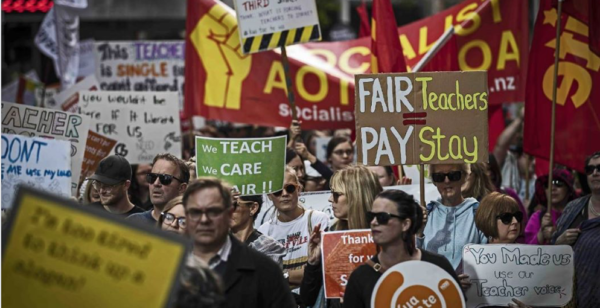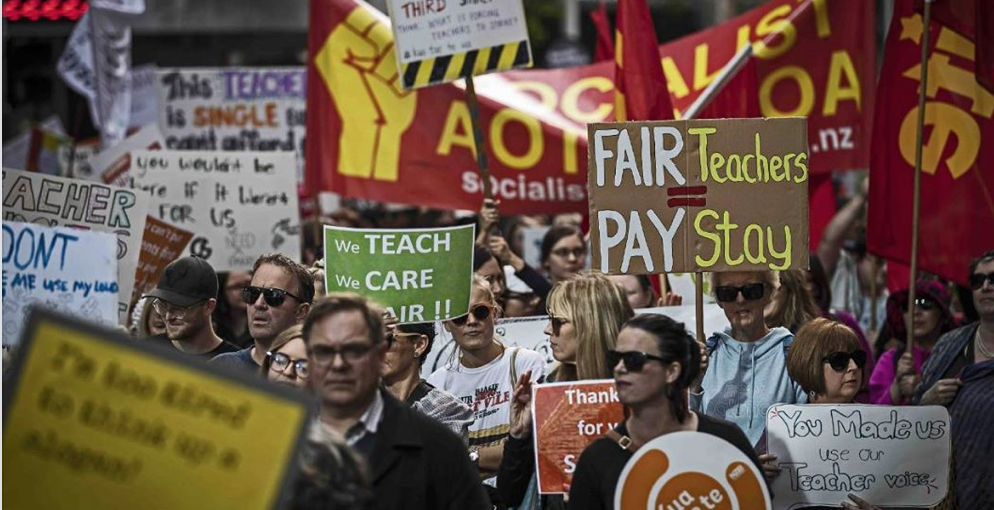
Just as the mega-strikes have finally forced the Government to take Teacher’s seriously, Hipkins is quietly offering sweetners to Union Leaders and the momentum that has forced the Government to listen is slowing…
‘Constructive progress’ in teacher talks; Year 10 rostering home day called off
Secondary teachers have cancelled industrial action planned for next week.
The Post Primary Teachers’ Association says it has called off the Year 10 rostering home day that was to have been on June 11.
That follows what PPTA president Jack Boyle described as “constructive progress” in talks on Thursday between teacher unions and Education Minister Chris Hipkins.
…the truth is that with a budget surplus as huge as Roberston now has, a meaningful increase in wages and conditions is possible for Teachers IF they are prepared to fight for it.
The Union movement in NZ is facing a unique challenge. Social media has allowed workers to connect with each other over shared concerns and this ability to connect has radicalised workers to being far more militant than their Union Leaderships are used to.
Beyond the Wellington Twitteratti professional Union class, workers want more than the aesthetic of activism, they actually want genuine change to their underfunded work conditions.
The neutering of the Union movement from the radical right wing agendas of the 1990s followed by the nothing Helen Clark did for workers, followed by the subdued fear under the Key has left most Union Leaders too shy to actually demand anything so the explosion of activism from the base has finally put real muscle back into negotiations.
Instead of accepting this wave of growing power, the Government want to privately whisper sweet nothings into the Union Leaders ears as opposed to properly funding education.
This could be a dangerous ploy, Teachers have felt the power of solidarity, if they are sold a watered down nothing by their Unions there will be hell to pay.






Is it not interesting (to say the least) that the politicians NEVER have to negotiate their pay?! Time was when teachers’ & politicians’ incomes were practically equal. Why do politicians think their “value” is virtually DOUBLE that of teachers (&/or every other well qualified worker)? How come MMP results in people no voter votes for (unless I’m missing something) becoming MPs who all start at $164,000 + $1000+ of that as expenses? What experience/qualifications do List MPs bring to the parliamentary table? I am more than sick & tired of how MMP twists the “value” of every MP compared to every other category of worker in my country!
+100 …good points …
Martyn this is scaremongering garbage.
Any deal must go to a vote from membership.
I am a secondary teacher. And the calling off of the industrial action on the 11th, whilst being legal in that in the fine print it says that the PPTA executive are allowed to cancel industrial action without checking with the membership, it seems anti democratic. It took so much time and so many people in the lumbering dinosaur known as the PPTA to approve industrial action that for the exec to call off industrial action in an instant doesn’t sit well with me. Is this the beginning of the usual scenario whereby the executive of the PPTA start promoting a crap deal because the govt have worn them down? I hope not. Because I don’t think we will get another opportunity in my life time to break the hold that a variety of Rogernomics has over us.
If the union leaders think they have a winner, they bring it back to the teachers to vote on. One would like to think that this would prevent a union leader from succumbing to underhanded influences. This article challenges the integrity of Jack Boyle which I think is unfair. We do not know the details of what has happened behind closed doors this past week. Hold your opinion until we find out the details please.
If it ends in tears it’ll probably be all be Generation (insert random letter here) ‘s fault!
I have seen the offer and it is a capitulation. The article highlighted some of the problems some unions have in not really knowing who and what they represent. It also shows how hard it is to change the status quo when people steering political organisations have no lived experience of nothing but a Neo-liberal operating system.
Comments are closed.